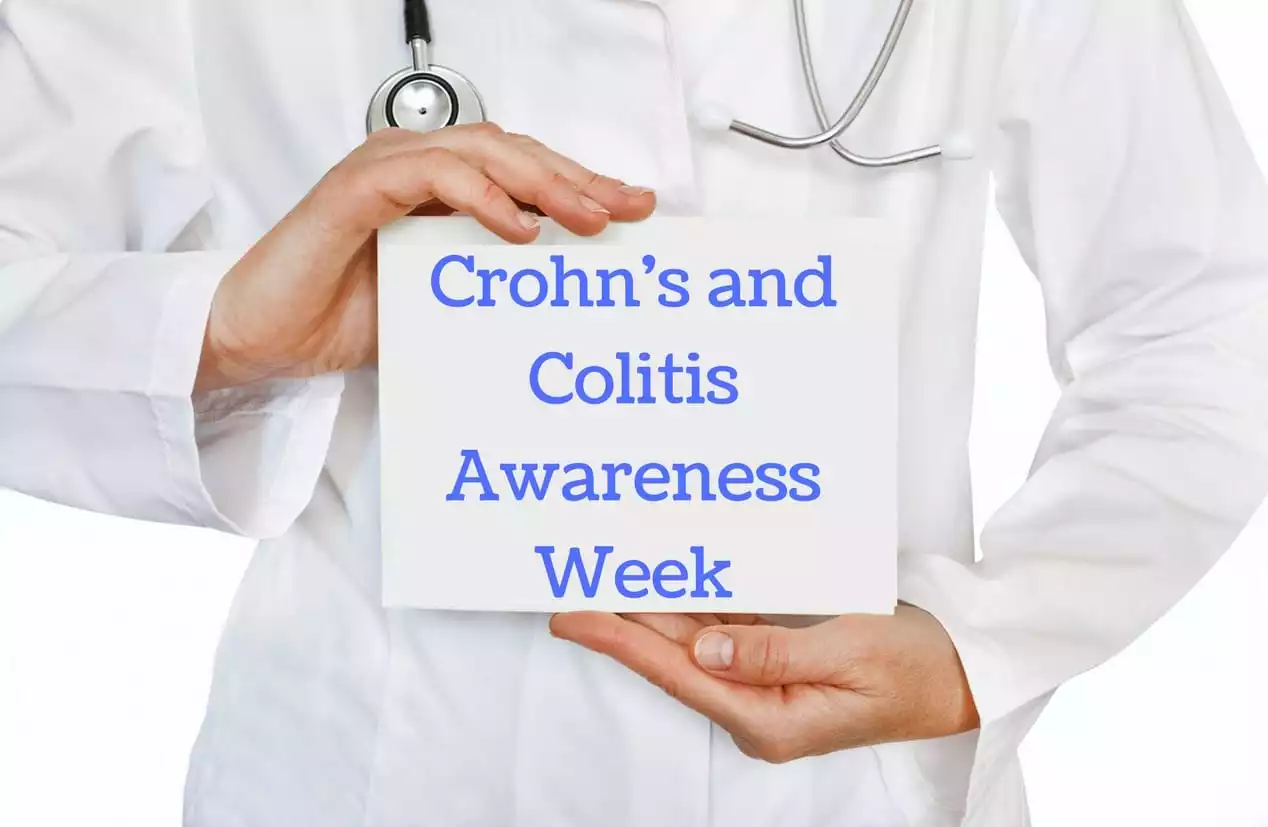
There’s been a great deal of attention and press recently concerning Crohn’s and Colitis. These difficult conditions can make patients very sick and can sometimes even be life-threatening. Science is making remarkable strides in treating these diseases, such as compounding Crohn’s disease medications, but neither has a cure at the current point in time.
In honor of Crohn’s and Colitis Awareness Week, we wanted to take the time to help you better understand Crohn’s and Colitis and whether you may be struggling with these illnesses yourself. If you’re an existing patient, you’ll also learn how to alleviate your symptoms during flares. By improving our Crohn’s and Colitis awareness, we can better help those suffering from such diseases.
Improving Crohn’s and Colitis Awareness
To increase Crohn’s and Colitis awareness, it’s important to understand what exactly these diseases are. Crohn’s Disease and Ulcerative Colitis (UC) are both chronic conditions which means that they are life long and ongoing. These diseases can range from mild to severe with individuals suffering from different symptoms at different times in their lives.
Many Crohn’s and Colitis patients experience remissons – periods of time where your health is good and you have almost no symptoms. Others experience repeated, unrelenting flare-ups where they relapse and symptoms worsen.
Some people refer to Crohn’s and Colitis as Inflammatory Bowel Diseases (IBD); this is because both conditions technically meet the criteria. However, patients must be clear in understanding that IBD is not the same thing as Irritable Bowel Syndrome, a disorder of the colon marked by problems with the organ’s muscle contractions.
As a whole, about 18 million Americans are affected by IBD. While IBD diseases tend affect both females and males in equal numbers, they do run in families, and most researchers suspect at least a weak genetic tie.
Caucasians, as an ethnic group, tend to be affected by IBD more frequently than any other race. Researchers aren’t yet sure why this happens. Although European Jews seem to be next in line, IBD rates in both Hispanics and African-Americans are also rising and are almost equal in number.
Ulcerative Colitis (UC) Symptoms and Causes
For Crohn’s and Colitis Awareness Week, we want to help you understand Ulcerative Colitis, along with its symptoms and causes. For some patients, they experience Colitis rather than IBD. The most common form of Colitis is Ulcerative Colitis (UC), a condition where ulcers develop along the bowel. Patients who experience Ulcerative Colitis often start with mild symptoms like diarrhea with bloody stool and abdominal pain, bowel movements that become more urgent and loose, abdominal pain that is crampy. Stools may also be bloody.
UC affects up to 907,000 Americans with diagnosis and typically occurs in relapse-remitting format throughout most of the 30s, 40s, and 50s. There is some evidence to show that aging may reduce symptoms.
Colitis can result in a reduced appetite, both from hesitancy to eat (eating produces stoll which leads to pain) and from poor digestion. Patients may experience weight loss, fatigue and low energy. Because Colitis makes it harder for the bowel to absorb nutrients, children with Colitis could have developmental delays and experience reduced growth or even deficiencies.
Causes
It’s not yet clear exactly what causes UC. It is often extremely difficult for doctors to determine if a particular treatment has been successful because people with Colitis often experience long periods in between flare-ups. These remissions can last months or even years, and patients may feel fully recovered. Eventually, nearly all UC patients do have a relapse.
Some researchers believe IBD could be caused by an autoimmune disorder, faulty inherited genes, or even environmental factors. Studies by the Crohn’s & Colitis Foundation (CCF) indicate that the disease may occur because of the way your immune system interacts with a bacterial infection or a virus. In people without UC, the body’s immune system causes inflammation within it that subsides as the infection or illness is subsides. If you have Colitis, that inflammation persists long after you regain your health.
Crohn’s Disease Symptoms and Causes
For Crohn’s and Colitis Awareness week, we must also understand Crohn’s Disease. Crohn’s Disease was first described in 1932 by Dr. Burrill B. Crohn and his colleagues, Dr. Gordon D. Oppenheimer and Dr. Leon Ginzburg. Like the other Inflammatory Bowel Diseases, Crohn’s causes widespread inflammation.
Crohn’s shares some of the same symptoms as UC, but it also carries a host of new and more troubling symptoms. Some of the most commons signs that the gastrointestinal tract is inflamed include:
- Abdominal pain and cramps
- An urgent need to move the bowels
- Constipation and/or obstruction
- Passing blood or red currant jelly stools
- Persistent diarrhea (often green or frothy)
- Alternating constipation and diarrhea rapidly
IBD may also produce night sweats, reduced appetite, fatigue, fever, disappearance of the menstrual cycle and weight loss.
Like Colitis, children who have Crohn’s Disease could experience delays in both their development and their growth because they cannot properly absorb nutrients. This is also true for adults, who may need to take additional supplements to compensate.
Differences Between Crohn’s and Colitis
To improve Crohn’s and Colitis awareness, it’s important to understand the difference between them. Though both Crohn’s and Colitis are Inflammatory Bowel Diseases, there are differences in symptoms and diagnostic signs between the two. Crohn’s Disease differs from UC in that Crohn’s can affect the entire gastrointestinal tract — all the way from the anus to the mouth. It most often affects the beginning of the colon and the end of the small bowel (also called the ileum). In contrast, Colitis affects only the colon itself (known as the large intestine).
Another way that the two conditions are different is that Colitis affects the colon’s innermost lining. Crohn’s, however, can affect the bowel wall’s entire thickness. If you have Crohn’s, there might be areas of diseased intestines interspersed with normal sections. People who suffer from ulcerative Colitis do not have this pattern upon exploratory surgery or camera scope investigation.
Treatment for Crohn’s and Colitis
For many people with Crohn’s Disease or UC, medication prescribed by your doctor provides immense relief and defense from additional damage. Medicines focus on reducing autoimmune action or decreasing inflammation in the intestines, and may include biologic immunosuppressants, steroids, and a variety of other drugs.
Because IBD can interfere with how you process or absorb meds, your doctor may need to try more than one med at more than one dose to find the right balance. Your local compounding pharmacy can help with this! Hand-compounded medications allow you and your medical care team to find the perfect balance that treats your symptoms without introducing more side effects.
If you have Crohn’s or Colitis, you should expect to visit your doctor on a regular basis in order to adjust either the type of medication, the dose or both. You may also be asked to adjust your lifestyle or your diet to make it easier for your body to process food and/or reduce symptoms. With more Crohn’s and Colitis awareness, hopefully you can talk to your doctor about treatment options before surgery is a necessary treatment option.
Surgical Intervention
As many as 75 percent of patients suffering from Crohn’s Disease, and up to 45 percent of patients with UC, will eventually require surgery for IBD as a long-term solution. Only your doctor can tell you if the surgery is elective or necessary according to your situation. Generally, surgery is a last-resort option saved for when other measures have failed.
Surgery for Colitis typically involves removing the rectum and the colon. If you have Crohn’s Disease, you’ll likely have one of two surgeries. Regardless of which surgery your doctor feels is best for you, the waste from your body will need to be rerouted so that it can pass more efficiently into an ostomy bag. Although the thought of having Crohn’s ostomy supplies might be scary, most people live normal and active lives after just a small adjustment period. In fact, for many patients, ostomy bags give them back their freedom so they can once again go about their lives.
During Crohn’s and Colitis Awareness Week, take the time to learn about these diseases. From there, you can understand the symptoms and treatment options available.

 info@burtsrx.com
info@burtsrx.com
